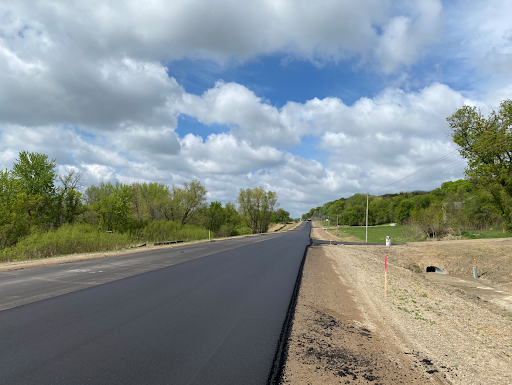Revamp Your Residential or commercial property's Charm: Hot Mix Asphalt Paving for Regrading Projects
Revamp Your Residential or commercial property's Charm: Hot Mix Asphalt Paving for Regrading Projects
Blog Article
Exploring the Ecological Advantages of Hot Mix Asphalt
The application of Warm Mix Asphalt in facilities tasks provides a compelling instance for sustainable development and ecological stewardship. By delving right into the elaborate details of its manufacturing processes and the cutting-edge usage of recycled materials, a much deeper understanding emerges of just how this innovation surpasses plain surface applications. The ecological advantages of Warm Mix Asphalt extend much beyond first perceptions, offering a nuanced perspective on just how this material can lead the way for a greener future.

Minimized Greenhouse Gas Emissions
The production procedure of Warm Mix Asphalt includes heating the mixture of accumulation and asphalt binder to high temperature levels. By integrating recovered asphalt pavement and recycled asphalt tiles right into the mix, the need for virgin materials is reduced, leading to energy savings and decreased exhausts connected with extraction and handling.
Research studies have revealed that Hot Mix Asphalt pavements have a smaller sized carbon footprint over their life cycle contrasted to other sidewalk choices. The sturdiness and recyclability of Hot Mix Asphalt better improve its environmental advantages by decreasing the need for regular maintenance or substitute, thus preserving resources and minimizing emissions related to repair activities.
Power Efficiency and Preservation
The production process of Warm Mix Asphalt not just decreases greenhouse gas exhausts but additionally contributes substantially to energy performance and conservation initiatives. Energy effectiveness is a vital advantage of Hot Mix Asphalt production compared to various other pavement types. The procedure includes heating the products at heats to produce the asphalt mix, which calls for less energy than alternate methods. Furthermore, the capacity to recycle and reuse asphalt pavement even more boosts energy conservation. By including reclaimed asphalt pavement (RAP) into brand-new blends, the industry saves energy that would certainly have been required to generate entirely new materials. The durability of Hot Mix Asphalt decreases the frequency of upkeep and reconstruction, leading to long-lasting energy cost savings. This durability lessens the energy-intensive procedures involved in regular repair work and replacements. In General, Hot Mix Asphalt sticks out as an eco-friendly option that prioritizes energy effectiveness and conservation throughout its lifecycle.
Lasting Pavement Solutions

One secret element of sustainable pavement options is making use of recycled products such as redeemed asphalt sidewalk (RAP) and recycled asphalt shingles (RAS) By integrating these materials into the asphalt combinations, the demand for virgin sources is minimized, bring about reduced power intake and greenhouse gas emissions during manufacturing. In addition, the reuse of these products assists divert waste from garbage regrading dumps, contributing to a more lasting and circular economic climate.
Additionally, sustainable sidewalk solutions concentrate on maximizing pavement design to enhance efficiency and durability. Methods such as cozy mix asphalt (WMA) and rock mastic asphalt (SMA) enhance the toughness and durability of pavements, lowering the demand for regular repair work and substitutes. By applying these ingenious approaches, framework programmers can create sidewalks that not just fulfill high-performance requirements but additionally lessen their environmental impact.
Minimized Environmental Impact
With an emphasis on sustainability and eco-conscious methods, sidewalk options are designed to decrease the environmental influence of building and upkeep processes. Hot mix asphalt, specifically, uses several advantages that contribute to minimizing the overall ecological footprint of roadway facilities. One key element is the recyclability of asphalt, which can be reused several times without endangering its high quality. This particular helps in preserving natural deposits and lowering the amount of waste sent out to landfills.
Moreover, the manufacturing of warm mix asphalt sends out reduced levels of greenhouse gases compared to various other sidewalk products, making it a more ecologically pleasant alternative. The energy performance of asphalt plants has additionally improved for many years, resulting in minimized gas intake and reduced emissions. Additionally, the smooth surface of hot mix asphalt lowers rolling resistance for vehicles, resulting in lower fuel usage and reduced air pollution from car discharges.
Payment to Environment Adjustment Reduction
Hot mix asphalt plays an important function in mitigating environment adjustment via its lasting properties and minimized environmental influence. One substantial payment to climate change mitigation comes from the energy effectiveness of hot mix asphalt production. Compared to other sidewalk choices, the manufacturing process for warm mix asphalt takes in less power and emits lower degrees of greenhouse gases, therefore decreasing its general carbon impact.
Furthermore, warm mix asphalt's capability to show sunshine, called albedo, helps in lowering metropolitan warm island effects. By decreasing warm absorption and retention, warm mix asphalt sidewalks can reduce the demand for cooling in metropolitan areas, subsequently reducing greenhouse gas emissions linked with energy consumption for cooling down purposes.
In addition, the toughness and recyclability of hot mix asphalt further improve its environment change reduction capabilities. Regrading. The lengthy life expectancy of asphalt sidewalks minimizes the need for frequent repairs or substitutes, ultimately lowering the carbon emissions connected to road upkeep tasks. In addition, the recyclability of asphalt materials decreases the demand for virgin sources and lowers the environmental influence of pavement building, aligning with sustainable techniques for climate modification reduction.
Final Thought
To conclude, the environmental benefits of Hot Mix Asphalt show its substantial contribution to reducing greenhouse gas emissions, preserving power, and decreasing environmental influence. This sustainable pavement option aligns with environment change reduction efforts, promotes resource preservation, and enhances framework growth. By making use of recycled products, energy-efficient production procedures, and sturdy layout, Hot Mix Asphalt plays a critical function in fostering an extra eco-friendly approach to facilities building.
The production procedure of Warm Mix Asphalt entails heating the combination of accumulation and asphalt binder to high temperature levels. By incorporating recovered asphalt sidewalk and recycled asphalt tiles into the mix, the need for virgin materials is lowered, leading to power savings and decreased emissions associated with removal and processing.
One secret facet of sustainable pavement options is the use of recycled products such as redeemed asphalt sidewalk (RAP) and recycled asphalt tiles (RAS) Techniques such as warm mix asphalt (WMA) and rock mastic asphalt (SMA) boost the toughness and resilience of sidewalks, minimizing the demand for frequent repair work and substitutes. Contrasted to various other pavement choices, the production process for hot mix asphalt consumes less power and sends out reduced levels of greenhouse gases, therefore decreasing its general carbon footprint.
Report this page